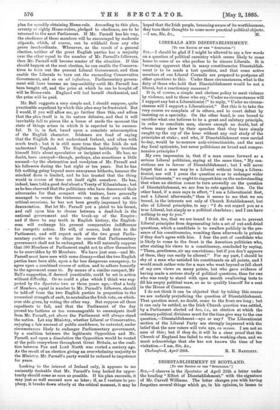LIBERALS AND DISESTABLISHMENT. rTo THE EDITOR OP TER "SPECTATOR."'
Sra,—I should be glad if I might be allowed to say a few words on a question of political casuistry which seems likely to come home to some of us who profess to be sincere Liberals. It is becoming apparent that in many constituencies Disestablishment is to be made a test question, and that some active members of our Liberal Councils are prepared to postpone all other questions to this. Under these circumstances, what is the duty of those who hold that Disestablishment would be not a liberal, but a reactionary measure ?
It is, of course, a simple and obvious policy to meet violence by violence, and to those who cry, "Under no circumstances will I support any bat a Liberationist !" to reply, "Under no circumstances will I support a Liberationist." But this is to take the very course we complain of in others, and to court defeat by insisting on a specialty. On the other hand, is one bound to sacrifice what one believes to be a great and salutary principle, in order to conciliate men, sincere enough no doubt, but of whom many show by their speeches that they have simply caught up the cry of the hour without any real study of the principles at stake ; and who, if Disestablishment were carried to-day, would be to-morrow anti-vivisectionists, and the next day local optionists, but never politicians on broad and comprehensive principles ?
My own impression is, that if a man comes forward as a serious Liberal politician, saying at the same time, "My convictions are in favour of Disestablishment ; but I will never forget that a man may be a Liberal without being a Liberationist, nor will I press the question so as to endanger wider Liberal interests," we ought to support him on the understanding that when an election comes to tarn avowedly on the question of Disestablishment, we are free to vote against him. On the other hand, if a man says in effect, "I am a Liberationist first, and a Liberal afterwards," then it seems to me that we are bound, in the interests not only of Church Establishment, but also of Liberal principles, to say : "I do not regard you as a true Liberal, but simply as a political charlatan ; and I can have nothing to say to you."
I think, too, that we are bound to do all we can to prevent
Liberal principles from degenerating into a set of cut-and-dried questions, which a candidate is to swallow publicly in the presence of his constituencies, vomiting them afterwards in private if they don't agree with him. I fear the sort of candidate who is likely to come to the front is the American politician who, after stating his views to a constituency, concluded by saying, "These, gentlemen, air my convictions ; but if you don't approve of them, they can easily be altered." For my part, I should be shy of a man who satisfied his constituents on all points, and I would much rather vote for a man who went beyond or fell short of my own views on many points, but who gave evidence of having made a serious study of political questions, than for one who was ready to stand with open month swallowing tests to 611 his empty political maw, so as to qualify himself for a seat in the House of Commons.
I do not think it can be objected that by taking this course we are unfairly prejudicing the question of Disestablishment. That question must, no doubt, come to the front ere long ; but it can only be settled, as the Irish Church question was settled, by a Parliament elected ad hoc, i.e., an election at which the ordinary political divisions must for the time give way to the one question,—Disestablishment—aye or nay ? The Liberationist section of the Liberal Party are strongly impressed with the belief that the new voters will vote aye, en mane. I am not so sure of this ; but if they do, it will be a clear proof that the Church of England has failed to win the working-class, and we must acknowledge that she has not known the time of her visitation.—I am, Sir, Stc.,
Chelmsford, April 28th. R. E. BLItTLETT.


































 Previous page
Previous page